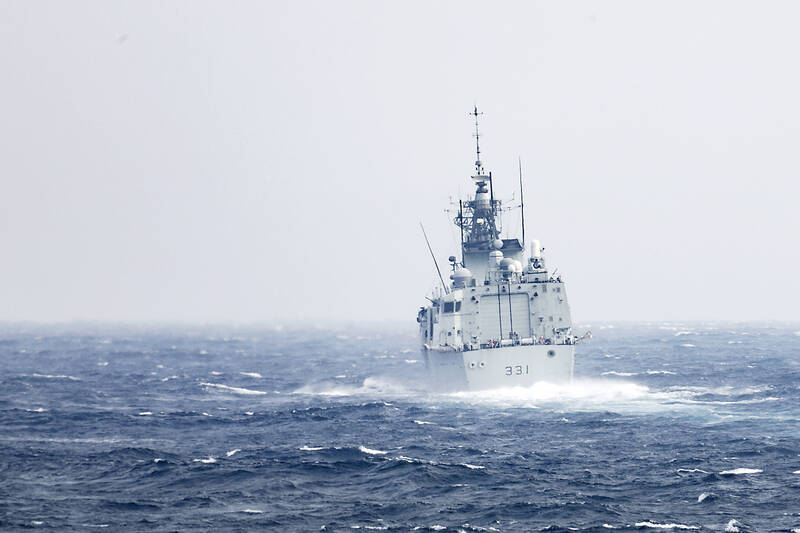A US destroyer and a Canadian frigate on Tuesday sailed through the Taiwan Strait in the latest joint operation aimed at reinforcing the route’s status as an international waterway.
Beijing views as its own the narrow body of water separating Taiwan from China — one of the world’s busiest shipping channels.
The US has long used “freedom of navigation” passages through the Strait to push back against Chinese claims and Western allies have increasingly joined these operations.

Photo: AP
The USS Higgins, an Arleigh Burke-class destroyer, in cooperation with the Royal Canadian Navy’s Halifax-class frigate the HMCS Vancouver “conducted a routine Taiwan Strait transit” on Tuesday “in accordance with international law,” the US Navy’s Seventh Fleet said.
“The ship transited through a corridor in the Strait that is beyond the territorial sea of any coastal state,” it said.
Canada said the Vancouver was en route to join an ongoing mission to enforce UN sanctions against North Korea when it transited with the Higgins.
“Today’s routine Taiwan Strait transit demonstrates our commitment to a free, open and inclusive Indo-Pacific,” Canadian Minister of National Defence Anita Anand said in a statement, using another term for the Asia-Pacific region.
In Taipei, the Ministry of National Defense confirmed the transit, saying in a statement that the military monitored the ships as they sailed north through the Strait, and did not see any irregularities.
Ministry of Foreign Affairs spokeswoman Joanne Ou (歐江安) yesterday said that her ministry welcomed and affirmed the stance of the Canadian and US governments regarding the legal status of the Strait as international waters, and the need to safeguard freedom of navigation, as well as regional peace and stability.
The passage also demonstrates democratic countries’ firm opposition to China’s attempts at expansionism, Ou said.
“The Taiwanese government will continue to strengthen its self-defense capabilities, resolutely resist authoritarian expansion and aggression, and deepen the close Taiwan-US security partnership,” she said. “We will strengthen cooperation with all like-minded countries to jointly safeguard the security of the Taiwan Strait and the rules-based international order.”
A spokesman for the Chinese People’s Liberation Army’s Eastern Theater Command called the transit “public hype.”
“The troops are always on high alert, resolutely counteract all threats and provocations, and resolutely defend national sovereignty and territorial integrity,” state broadcaster China Central Television quoted Colonel Shi Yi (施毅) as saying.
Australian, British, Canadian and French warships have sailed through the Strait in the past few years, sparking protests from Beijing.
The latest joint passage came a day after US President Joe Biden again declared that US troops would come to Taiwan’s aid in the event of a Chinese invasion.
It was the fourth time Biden made such comments, despite Washington’s longstanding official policy of “strategic ambiguity” — designed to ward off a Chinese invasion and discourage Taiwan from provoking Beijing by formally declaring independence.
Each time after Biden’s comments, the White House said there was no change in US policy on Taiwan.
Additional reporting by CNA

The Ministry of Foreign Affairs (MOFA) yesterday said it is closely monitoring developments in Venezuela, and would continue to cooperate with democratic allies and work together for regional and global security, stability, and prosperity. The remarks came after the US on Saturday launched a series of airstrikes in Venezuela and kidnapped Venezuelan President Nicolas Maduro, who was later flown to New York along with his wife. The pair face US charges related to drug trafficking and alleged cooperation with gangs designated as terrorist organizations. Maduro has denied the allegations. The ministry said that it is closely monitoring the political and economic situation

Conflict with Taiwan could leave China with “massive economic disruption, catastrophic military losses, significant social unrest, and devastating sanctions,” a US think tank said in a report released on Monday. The German Marshall Fund released a report titled If China Attacks Taiwan: The Consequences for China of “Minor Conflict” and “Major War” Scenarios. The report details the “massive” economic, military, social and international costs to China in the event of a minor conflict or major war with Taiwan, estimating that the Chinese People’s Liberation Army (PLA) could sustain losses of more than half of its active-duty ground forces, including 100,000 troops. Understanding Chinese

UNRELENTING: China attempted cyberattacks on Taiwan’s critical infrastructure 2.63 million times per day last year, up from 1.23 million in 2023, the NSB said China’s cyberarmy has long engaged in cyberattacks against Taiwan’s critical infrastructure, employing diverse and evolving tactics, the National Security Bureau (NSB) said yesterday, adding that cyberattacks on critical energy infrastructure last year increased 10-fold compared with the previous year. The NSB yesterday released a report titled Analysis on China’s Cyber Threats to Taiwan’s Critical Infrastructure in 2025, outlining the number of cyberattacks, major tactics and hacker groups. Taiwan’s national intelligence community identified a large number of cybersecurity incidents last year, the bureau said in a statement. China’s cyberarmy last year launched an average of 2.63 million intrusion attempts per day targeting Taiwan’s critical

‘SLICING METHOD’: In the event of a blockade, the China Coast Guard would intercept Taiwanese ships while its navy would seek to deter foreign intervention China’s military drills around Taiwan this week signaled potential strategies to cut the nation off from energy supplies and foreign military assistance, a US think tank report said. The Chinese People’s Liberation Army (PLA) conducted what it called “Justice Mission 2025” exercises from Monday to Tuesday in five maritime zones and airspace around Taiwan, calling them a warning to “Taiwanese independence” forces. In a report released on Wednesday, the Institute for the Study of War said the exercises effectively simulated blocking shipping routes to major port cities, including Kaohsiung, Keelung and Hualien. Taiwan would be highly vulnerable under such a blockade, because it